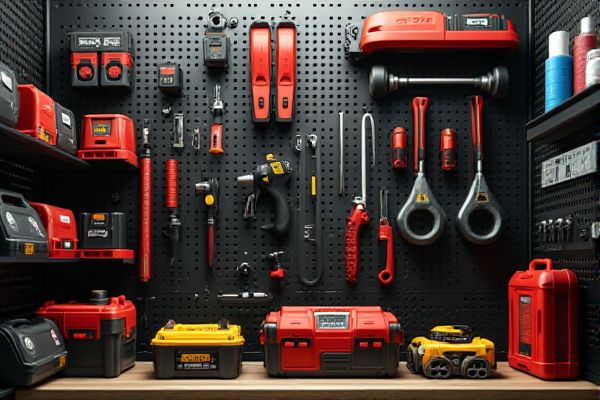
A battery organizer keeps your batteries neatly sorted by size and type, preventing leakage and making it easy to find the right power source quickly. Comparing it with a tool organizer helps you understand how to best manage Your workspace efficiently; explore the rest of the article to discover which organizer suits your needs.
Table of Comparison
| Feature | Battery Organizer | Tool Organizer |
|---|---|---|
| Primary Purpose | Stores and protects batteries | Holds and arranges tools |
| Design | Compartmentalized slots for different battery sizes | Compartments, hooks, and trays for various tools |
| Material | Plastic or metal, insulated for safety | Durable plastic, metal, or wood |
| Portability | Usually compact and lightweight | Varies; from portable cases to heavy toolboxes |
| Capacity | Holds multiple battery types reliably | Can store a wide range of tool sizes and types |
| Use Case | Ideal for electronics enthusiasts and households | Used by professionals and DIY enthusiasts |
| Safety Features | Prevents battery short-circuiting and damage | Organizes tools safely, reducing accidents |
Introduction to Battery and Tool Organizers
Battery organizers efficiently store and categorize your batteries by size and type, preventing leakage and ensuring easy access for devices. Tool organizers, designed with compartments and holders, keep hand tools sorted and accessible, improving workspace efficiency. Choosing the right organizer depends on whether you need to manage power sources or hardware tools for your projects.
Purpose and Functionality Comparison
A battery organizer is designed to store and protect various types and sizes of batteries, ensuring easy access and preventing corrosion or leakage. In contrast, a tool organizer prioritizes arranging and securing hand tools, power tools, and accessories for efficient workflow and quick retrieval. While both enhance organization, battery organizers focus on electrical component safety, whereas tool organizers emphasize tool preservation and workspace optimization.
Material and Build Quality Differences
Battery organizers typically feature lightweight plastic or silicone compartments designed to protect batteries from short circuits and corrosion, emphasizing durability and resistance to chemical damage. Tool organizers are often constructed from heavy-duty materials like reinforced plastic, metal, or fabric with reinforced stitching to withstand the weight and rough handling of various tools. Your choice should consider whether you need specialized protection for batteries or robust support for heavy and irregularly shaped tools.
Space-Saving Features of Both Organizers
Battery organizers maximize space efficiency by offering compact compartments tailored to various battery sizes, preventing clutter and ensuring easy access. Tool organizers feature customizable slots, hooks, and trays designed to neatly store multiple tools in a condensed area, reducing workspace mess. Both organizers optimize storage by utilizing vertical and modular designs, enhancing accessibility while conserving valuable space.
Versatility and Storage Capacity
Battery organizers offer specialized compartments designed to securely store various battery sizes, maximizing space efficiency and preventing damage or leakage. Tool organizers provide versatile storage options with adjustable compartments, hooks, and trays, allowing you to accommodate a wide range of tools and accessories in one accessible location. Choosing between the two depends on whether you prioritize dedicated battery protection or a flexible system to manage diverse tools and equipment.
Ease of Access and Organization
A battery organizer features dedicated compartments that prevent batteries from rolling or mixing, allowing you to quickly find the right size and type for your devices. In contrast, a tool organizer offers segmented slots and holders designed to keep various tools neatly arranged, reducing clutter and improving workflow efficiency. Your choice depends on whether you need quick access to small power sources or a well-structured system for diverse tools.
Portability and Mobility Considerations
Battery organizers are typically compact and lightweight, designed for easy transport and quick access to various battery sizes on the go. Tool organizers, on the other hand, often require more robust, bulkier cases to accommodate numerous and heavy tools, which can limit portability and mobility. Choosing between them depends on the balance between the need for easy carrying and the volume or weight of items to be organized.
Safety and Protection Aspects
Battery organizers provide specialized compartments designed to prevent short circuits and leakage, enhancing safety during storage and transport. Tool organizers often feature robust padding and secure slots to protect instruments from damage and accidental activation. Choosing the right organizer ensures Your batteries and tools are safely stored, reducing risks of injury and equipment failure.
Cost and Value Analysis
Battery organizers typically cost less due to simpler compartments designed specifically for batteries, offering excellent value for users seeking dedicated storage that prevents battery corrosion and loss. Tool organizers, while generally more expensive, provide versatile storage solutions with multiple compartments tailored for various tools, enhancing workspace efficiency and protecting valuable equipment. Choosing between the two depends on balancing budget constraints with storage needs, where battery organizers excel in affordability and specialization, and tool organizers deliver broader utility and investment protection.
Choosing the Right Organizer for Your Needs
Selecting the right organizer depends on your specific storage requirements and usage frequency. Battery organizers are designed with compartments that prevent battery corrosion and allow easy identification of battery types, ideal for electronics enthusiasts and households with multiple battery-powered devices. Tool organizers offer versatile storage options with customizable compartments, making them suitable for professionals and DIYers who need quick access to various hand and power tools.
 homyna.com
homyna.com